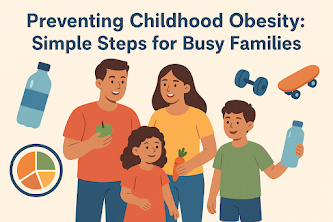

Childhood obesity is a growing concern worldwide, and its impact extends beyond physical health to emotional and social well-being. For busy families juggling work, school, and extracurricular activities, maintaining healthy habits can seem challenging. However, small, consistent changes in daily routines can make a big difference in preventing childhood obesity and fostering lifelong healthy habits.
Childhood obesity occurs when a child carries excess body fat that negatively impacts their health. It is usually measured using the Body Mass Index (BMI) adjusted for age and sex. While some children may have a larger build naturally, obesity is often a result of an imbalance between calories consumed and calories burned.
Childhood obesity occurs when a child carries excess body fat that negatively affects their health. It can increase the risk of chronic conditions such as diabetes, high blood pressure, and heart disease later in life. Genetics, environment, and lifestyle habits all play a role, but families have a significant influence on shaping healthy behaviors.
1. Prioritize Balanced Nutrition
2. Encourage Regular Physical Activity
3. Build Healthy Habits at Home
4. Involve Children in Choices
5. Focus on Mental and Emotional Well-being
Several factors contribute to childhood obesity:
1. Poor Diet: High-calorie, low-nutrient foods like sugary drinks, fast food, and processed snacks.
2. Sedentary Lifestyle: Excessive screen time and lack of physical activity.
3. Genetics: Family history can increase susceptibility, though lifestyle choices remain critical.
4. Emotional Factors: Stress, anxiety, and emotional eating can lead to weight gain.
5. Medical Conditions: Rare hormonal or metabolic disorders may also contribute.
Obese children are at risk for both short-term and long-term health issues:
1. Physical Health: Increased risk of type 2 diabetes, high blood pressure, heart disease, joint problems, and sleep apnea.
2. Emotional Health: Low self-esteem, body image issues, depression, and social isolation
3. Long-Term Impact: Childhood obesity often continues into adulthood, leading to chronic illnesses.
Childhood obesity is preventable with awareness, proper nutrition, physical activity, and emotional support. By fostering healthy habits early, parents can help children grow into strong, confident, and healthy adults. Early intervention not only protects their physical health but also promotes emotional well-being and a positive relationship with food and exercise.

Welcome to Atlas Multi Specialty Clinics, dedicated to prioritizing your health and well-being in the heart of Hyderabad’s Financial District, Telangana.
Atlas multi specialty clinics, The District, l202,
Financial District, Nanakramguda,
Hyderabad, Telangana 500032
atlasmultispecialityclinic@gmail.com
+91-7993366823
+91-9393000124
Copyright © Atlas Multi Specialty Clinics. All rights reserved.